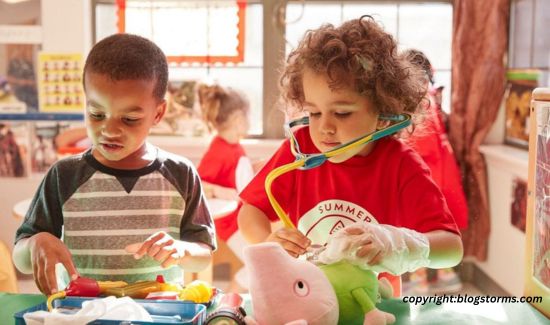Childhood is a pivotal phase marked by curiosity, innocence, and boundless imagination, shaping the foundation of an individual’s future experiences and perspectives. It is a time of exploration, learning, and forming essential connections that lay the groundwork for lifelong development and well-being. Pretend play is a pivotal part of childhood, offering more than just an enjoyable activity for children—it plays a crucial role in their cognitive, social, and emotional development.
Children learn to navigate the world around them in safe and imaginative ways by engaging in make-believe with toys like a kids doctor set. This article explores how pretend play nurtures various aspects of child development, making it an essential activity for growing minds.
Table of Contents
Fostering Creativity and Imagination
Pretend play allows children to use their creativity and imagination without limitations. When children pick up a stethoscope from a doctor’s set, they are not just playing; they are imagining themselves in the role of a doctor. This lets children create scenarios they have seen in the real world or come up with entirely from their imaginations. Creativity developed through pretend play can enhance problem-solving skills and innovation later in life.
Enhancing Cognitive Abilities
Pretend play often involves problem-solving, organisation, and sequencing, which are critical cognitive abilities. For instance, when using a kids doctor set, a child learns how to examine a patient: checking the heartbeat, using a thermometer, and then prescribing medicine. Such activities help develop children’s ability to follow complex sequences and enhance their memory skills, which are vital for academic success.
Developing Language and Communication Skills
During pretend play, children communicate constantly with their peers or imaginary friends. They negotiate roles, collaborate on storylines, and converse using vocabulary related to their play, such as medical terms, when playing with a doctor’s set. This interaction boosts vocabulary, improves fluency, and helps children master the art of conversation and listening—skills critical for personal and professional success.
Building Social Skills
Pretend play is often a social activity that involves playing together with other children. It teaches kids how to cooperate, share responsibilities, and solve conflicts. For example, when multiple children play with a kids’ doctor set, they learn to share the medical instruments and take turns as doctors or patients. These experiences teach children the importance of teamwork and empathy by considering other people’s perspectives.
Supporting Emotional Development
Pretend play provides a unique opportunity for children to express their feelings and cope with them through play. Playing different roles allows children to explore a wide range of emotions, from empathy and care to fear and reassurance. This can help them understand their own emotions better and develop the skills to manage them appropriately.
Encouraging Independence
Children develop a sense of independence and confidence as they direct their own play, make decisions, and solve problems. Whether they are deciding how their day as a doctor progresses with their doctor set or how to treat a sick teddy bear, they are making decisions independently of adult intervention. This boosts their confidence in making decisions and leading activities independently.
Pretend play is an essential component of early childhood development that should be encouraged both at home and in educational settings. The benefits of engaging in pretend play with tools like a kids doctor set are manifold, contributing significantly to a child’s cognitive, social, emotional, and linguistic growth. For parents looking to improve the quality of their children’s playtime, incorporating pretend play into their daily activities is a decision that will pay dividends in their overall development.
